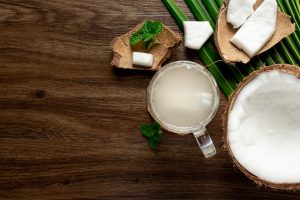
Skin is the largest organ of our body and the one which is directly exposed to the outer environment everyday. There are a lot of external factors like sunlight, wind, dust, cold weather, alcohol, smoking, etc. and internal factors like dehydration, aging, poor nutrition, stress and lack of sleep that can damage the skin. When we feel that our skin is damaged or to prevent skin damage, a lot of us tend to fall for the plethora of skin care products that are available in the market. But in reality, we need to work on fixing our damaged skin internally rather than using external products that can possibly contain many types of chemicals. So what do we do for skin repair? The answer is easy – It’s the vitamins in our diet!
Which Vitamins Can Be Used For Skin Repair?
There are many vitamins found in food itself that can be used for skin repair as opposed to using supplements. Let’s take a look at which vitamins can work wonders for skin repair.
- Vitamin A: Rich in antioxidants, it protects our skin from sunburn by preventing the breakdown of collagen, a protein that gives elasticity to skin. Hence, Vitamin A helps in regeneration of both upper and lower layers of skin cells. Vitamin A helps to moisturize the skin when damaged, itchy, dry and bumpy. In cases of inflammation or wounds, where germs can directly enter the body through the skin, the antioxidants in Vitamin A can also help protect the body from harmful free radicals. Orange colored foods like carrots, papaya, sweet potato, mango, dried apricot, pumpkin, red bell pepper, tomato and cantaloupe are some of the examples of foods that are high in Vitamin A. Liver meat for non vegetarians are also rich in Vitamin A.
- Vitamin B: Some of the research studies found that Vitamin B helps in formation of new skin cells. Riboflavin, the Vitamin B2, helps in maintaining healthy collagen levels and balancing the oil in our skin which heals the skin dryness. Foods like Almonds, spinach, beef liver, dairy products and mushrooms are Vitamin B2 rich food. Niacin, Vitamin B3 is good for treating sun damaged skin, eczema, dry skin, and rosacea by conditioning the skin. Dairy products, fish, chicken, cereals and mushrooms are rich in Vitamin B3. Pantathonic acid or Vitamin B5 helps in maintaining the moisture of the skin by keeping it hydrated. This is good for skin repair and preventing aging and acne. This Vitamin can be found in mushrooms, broccoli, sweet potato and avocado. Vitamin B7 or Biotin helps in repairing the skin from acne, fungal infections, and rashes. Vitamin B7 is high in foods like almonds, tomatoes, onions, eggs, sardine fish and sweet potatoes. Skin cell damage caused by free radicals can be fixed with Vitamin B9 or Folic acid found in foods such as green leafy vegetables, nuts, seeds, beets and okra. People who are suffering from chronic skin conditions like psoriasis, eczema, and dermatitis, Vitamin B12 works best in reducing the inflammation, dryness and redness of skin and makes the healing faster. Rich food sources of Vitamin B12 include dairy, fish, meat and eggs.
- Vitamin C: or Ascorbic acid, a water soluble vitamin, is not synthesized in our body. Vitamin C has a huge role in natural production of collagen in our body. Vitamin C is widely useful in treating photoaging, altered pigmentation, hyperpigmentation and immune suppression due to the exposure to UV rays from the sun. Vitamin C has powerful antioxidants as it promotes tissue healing in such cases. Vitamin C heals the skin by neutralizing the free radicals that cause oxidative stress. Dry skin, another common skin issue, may be due to environmental changes, dehydration or aging too. The outer layer of skin has barrier lipids to prevent dryness. When there is deficiency of these lipids, it causes dryness. Vitamin C is believed to help in production of these barrier lipids and also prevents water or moisture loss from skin. Vitamin C can be found in all citrus fruits like Oranges, tangerines, grapefruit, lemon, kiwi, strawberries, green pepper, guavas, cherries, plum, broccoli, and cantaloupe.
- Vitamin D: There are few research studies concluded that Vitamin D helps in wound healing and also modulates the inflammation. Apart from this, Vitamin D has antimicrobial properties which may help in treating acne developed due to bacterial overgrowth. Vitamin D is available naturally through exposure to sunlight, a variety of fishes like sardines, salmon, herring, mackerel, egg yolk, and fortified foods like cereals.
- Vitamin E: Vitamin E is one of the most familiar and important Vitamin related to dermatology since ages. This is a fat soluble antioxidant vitamin which has photoprotective and anti tumorigenic properties. Vitamin E acts as a scavenger against free radicals and protects the skin against solar radiation. This Vitamin is one of the best treatments for skin conditions like atopic dermatitis, epidermolysis bullosa, psoriasis, melasma, acne vulgaris, scleroderma, Chronic cutaneous lupus erythematosus and cutaneous ulcers. Nuts and seeds like almonds, hazelnuts,pine nuts, sunflower seeds, and avocado are some of the rich sources of Vitamin E that we can get from food.
Remember that it is always better to avoid self medication of Vitamin supplements as overdosing can cause severe side effects since some amount of vitamins are already consumed through food. Having a variety of nutrient rich foods like fruits, vegetables and others is a better idea to get all the necessary vitamins. Though there may be topical Vitamins available in the market for skin repair, it’s always better to get all the Vitamins through food internally for better skin repair.
Before you begin consuming any of the foods listed above, please consult your doctor, nutritionist or dietitian to find out if you have any allergies or deficiencies. We hope this article helps you. Do leave your thoughts in the comments below. For more on skin repair, check out Healthy Reads or speak to a GOQii Coach by subscribing for Personalised Health Coaching here.
#BeTheForce

 Before we dive into the foods which can help you relieve constipation, it is necessary to understand the factors which contribute to this. Constipation in simple terms means the inability to empty the by-products or waste matter of digestion from colon due to peristalsis – a process in which muscles in the intestine contract and relax to cause a wave-like motion. As 1 food passes through the colon (large intestine), water gets absorbed and the remaining matter forms stool.
Before we dive into the foods which can help you relieve constipation, it is necessary to understand the factors which contribute to this. Constipation in simple terms means the inability to empty the by-products or waste matter of digestion from colon due to peristalsis – a process in which muscles in the intestine contract and relax to cause a wave-like motion. As 1 food passes through the colon (large intestine), water gets absorbed and the remaining matter forms stool. Ever eaten something that made you feel uneasy? Did it turn your stomach into a balloon? Does this happen all the time? Well, you’re a victim to gas and bloating! It can be a terrible experience after you’ve thoroughly enjoyed your meals. There are several reasons for gas and bloating. So let’s understand them and look at a few remedies that will help you out.
Ever eaten something that made you feel uneasy? Did it turn your stomach into a balloon? Does this happen all the time? Well, you’re a victim to gas and bloating! It can be a terrible experience after you’ve thoroughly enjoyed your meals. There are several reasons for gas and bloating. So let’s understand them and look at a few remedies that will help you out. 


